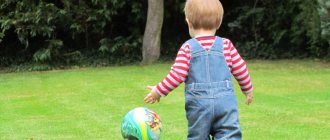- November 21, 2018
- Child psychology
- Artem Minasov
All parents look forward to the moment when their children begin to understand what they are being told. Speech proficiency is the most important task that the baby has to solve. To cope with this, you need to begin to perceive individual words, pronounce them and combine them into phrases. And parents are obliged to help their baby. It’s not easy, but the first cherished words “mom” and “dad” will bring so many emotions.
When children start talking: first attempts
It is almost impossible to say exactly when a child begins to understand what is being said to him. All children begin to develop speech and word recognition at different times. Some begin to speak earlier, others much later; in any case, the baby will not do it right away. First, the child will remember sounds and words and try to perceive them. Later the baby will start to walk. After six months of life, the humming will be replaced by babbling. The child will make attempts to pronounce the simplest syllables - “ma”, “ba”, “da”. And he will begin to understand words. These words are very simple, and they do not have a stressed syllable. As a rule, children try to name the most important things and actions.
For example, if a mother constantly names objects to her child, then he will answer the next question: “Where is the door?” – will turn his head in her direction. The baby will also try to joyfully copy adults in their actions: he will try to drink from a cup, and often has fun when he feels that he is understood.
The baby is trying to say: how to behave?
The first time conscious words are heard from a baby is from 8 to 12 months. This is usually the period when the child begins to understand adults. He tries to turn to mom or dad, and sometimes asks for an item. Parents, as a rule, are incredibly happy, believing that their child is finally starting to speak. However, statistics show that speaking words for a long time does not carry any semantic meaning.
How can you teach a child a word? Komarovsky
Experienced pediatrician E. Komarovsky identifies three rules regarding the word “impossible”:
- The child’s screams should not change the decision of the parent who said “no”
- You should not allow situations where dad says “no” and mom says “yes”
- “No” is always “no”, i.e. It shouldn’t be possible today, but tomorrow it’s possible
- In addition, the pediatrician supports the opinion that in order for a child to learn the word “no” and perceive it adequately, there should not be many prohibitions. “No” from the lips of parents should be heard rarely, but carried out by the child unquestioningly. In other words, the baby should see this word as a real threat.
- The doctor advises starting to teach a child the word “no” as early as possible (when the child is still crawling), while most parents begin to pay serious attention to the child’s disobedience only at 4-5 years old
- Thus, in order to teach a child the word “no”, get him to truly understand this word and develop an appropriate reaction, you need to pay due attention to this, follow certain principles and be persistent
At what age does a child begin to understand?
All children are different. You can find many tables that describe what children can do at a given age. However, each child has his own individual parameters. Despite this, parents should definitely study the information on how the child’s age corresponds to his speech development:
- 1–3 months - the child screams, cries loudly, tries to repeat simple sounds - “a-a”, “a-gu”, “a-wu”.
- 4–5 months – the baby laughs, squeals, and makes drawn-out sounds with different intonations and emotions.
- 6 months - the baby recognizes the voices of his parents, tries to babble, makes sounds a little like “ma”, “pa”.
- 7–8 months – the child perceives words and simple requests (give, take). This is exactly the age when a child begins to understand the word “no” and imitates the bark of a dog or the sounds made by other animals. At 8 months, the baby remembers the names of some objects, but still cannot pronounce them.
- 9–11 months - the baby learns to speak simple words - “mom”, “dad”, “na”, “give”. His vocabulary contains no more than 10 words.
- 1–1.5 years – the child knows how to form word combinations, knows what some animals and people look like, and can identify them from illustrations.
- 2–3 years – children understand and learn to ask questions, know different concepts, carry out simple tasks, make sentences, learn and tell fairy tales and poems.
- 3–4 years old - the child already talks not only with mom and dad, but also with relatives and sometimes with unfamiliar children.
According to long-term statistics, the first word of most children is “mama” or “dai.”
Rule No. 4: “Patience and work will grind everything down”
You should not think that a one-year-old baby will understand the prohibition right away. Its full comprehension still exceeds the capabilities of a child's mind. Active resistance is not caused by willfulness, but by misunderstanding. The task of education is to try to clearly explain to the child the consequences of violating the prohibition through regular repetition of similar situations.
One-year-old children are perfectly aware of body language, facial expressions and emotions. At this age, mother’s frightened face works much more effectively than explaining that there is a biting beast inside the socket – electricity.
When disobedience does not pose a danger to the baby’s life, give him the opportunity to do his own thing. He will see the result, and the need for repetition will gradually disappear. Many one-year-old children like to drop toys or spill water. Allow them these cute pranks: from each such experience, kids extract valuable information that is difficult to explain in words.
Read also…. How to boost a child's immunity? Simple and effective.
Limits and rules must be agreed upon within the family. When mom says “you can’t,” dad or grandma shouldn’t say “you can.” Such bifurcation is difficult to comprehend even for an adult, and for a one-year-old baby it is more difficult than Newton’s binomial.
Becoming Conscious Speech
The pronunciation of these words may not be perfect, but it is recognizable. In addition, the baby speaks in certain situations: the word “mom” is pronounced when she enters or leaves the room. If a baby points, for example, at a cat, saying “kitty,” it is important for parents to confirm that it is a cat, and then check with him where it is. If a child points to an animal, it means that he is beginning to understand. Later, the child will be able to answer certain questions not with a simple hum, but with a specific word.
Even if the child does not speak, this is not yet a reason to panic. Most likely, he will quickly catch up with the norm. After a year of life, the baby rapidly fills its vocabulary. Thus, without yet uttering the name of a certain object, he understands what the adult is talking about. The baby begins to fulfill simple requests, for example, he can bring a ball or a toy, and also often resorts to a pointing gesture, which is accompanied by a demanding intonation. This indicates that a stage is gradually approaching when the child begins to understand what is being said to him.
Causes of delay in the development of the speech apparatus
Soon the long-awaited moment comes when the child begins to understand speech. Parents are obliged to take part in every possible way in the development of the baby’s speech apparatus, adhering to a simple rule: constantly talk to the baby from the first months, and be sure to pronounce the words correctly. Babysitting will most likely slow down the development of the speech apparatus and is quite capable of causing problems with speech in the future. However, all children learn to speak at different speeds. Most often, girls begin to speak earlier than boys.
Often inexperienced parents try to determine at what age the child begins to understand words and try to pronounce them. If a child does not begin to speak at the age of 2.5 years, then there is a need to consult a specialist. However, you should not go to extremes. There is no need to demand too much from the baby; it is necessary to take into account his development and age. At the same time, it is unacceptable to ignore the existing problem, because developmental delays are easier to correct at the initial stage. Speech delays are quite common and can be due to the following reasons:
- Heredity. Probably, mom or dad started talking at a late age, and the child inherited this feature.
- Problems with hearing or speech apparatus. Most likely, these organs are not developed enough. Only doctors can determine this more precisely.
- Neurological disorders caused by hypoxia during childbirth or illness.
- There is little or no dialogue with the child.
- Active child. He is in a hurry to explore the world, his physical development is higher than his speech.
- Tensions between parents. Children subtly perceive the atmosphere in the family, which affects their development.
The sooner the doctor understands the exact cause of delays in speech development, the faster he will help get rid of them. Treatment will help the child quickly catch up and speak correctly. By the time he goes to school, the baby will not be different from other children.
Development of speech understanding. When to contact specialists?
The development of speech understanding significantly advances the development of the child’s own speech. The very first manifestation of speech understanding is a reaction to the human voice. Already at the end of the second week of life, the baby stops crying when they start talking to him. By the end of the first month, a lullaby has a calming effect on the baby. At the age of 7–8 months, the baby understands the meaning of small everyday phrases, accompanied by appropriate gestures and facial expressions ('let's go for a walk', 'make some ok', etc.). At 9–10 months, the child understands the meaning of individual words and turns his head towards the named object (“Where is mom?”, “Where is the car?”). The baby can still understand speech only in a certain situation (situational understanding of speech). Under other conditions, the same questions will seem incomprehensible to the child. The child masters the understanding of speech from the general to the specific - at first only the general meaning of the statement, intonation is learned, and only later the child learns the meaning of individual words. Specialists have to be very careful about parents' statements that “the child understands everything.” Typically, parents do not distinguish between true speech understanding and situational speech understanding, when the child is guided largely by the situation, gestures, etc. A child's understanding of the grammatical meanings of words can be tested using special tasks. At the age of 3, the child should show in pictures or objects the singular and plural ('Where is the table drawn, and where are the tables?'), the meaning of diminutive suffixes ('Where is the table, and where is the table?'). Know the meaning of spatial prepositions ('Put the ball ON the table, IN the table, UNDER the table', etc.). If a child can perform such tasks without relying on a visual situation and a prompting gesture from an adult, he has developed an understanding of speech. A delay in the development of a child's understanding of speech is an alarming signal. The cause may be mental retardation, hearing loss, serious speech disorder, or an extreme degree of pedagogical neglect. If you notice a lag in the development of your child’s understanding of speech, you should immediately contact a specialist. In most cases, timely treatment dramatically changes the situation for the better. It is important to realize that understanding speech always precedes one’s own speech. If a child does not understand any grammatical structures or words, then he simply will not be able to use them in speech.
Recommendations for parents to help their child start speaking
The time when children begin to understand what they are told depends entirely on the parents and their participation in the child's development. To help your baby begin to pronounce the first phrases, you should follow these recommendations:
- If possible, talk to your child as much as possible, talking through all your actions many times. Listening to his parents speak, he replenishes his vocabulary. You can accompany your daily activities with songs, because children easily perceive such text.
- To begin with, you should resort to short phrases; the baby will not immediately perceive complex sentences.
- The baby's cooing and babbling should be repeated constantly. It is necessary for the child to see the face of the speaker, then he will establish a connection between the source of the sound and the pronunciation.
- You cannot lisp, speech must be clear and correct. But when naming objects, you can resort to two names: full and imitative. For example, “cat”, “kitty-kitty”. In this case, the baby will listen to the word that is easier for him to pronounce, and after the required time has passed, he will move on to the correct form.
- It is useful to read books to children. Of course, you should choose them by age. Nursery rhymes and simple rhymes will do. A one-year-old baby will be interested in looking at the pictures. Later, you should encourage him to name the objects in the pictures. After one and a half years - encourage students to finish lines in poetry.
- You need to pay a lot of attention to fine motor skills. It is closely related to the speech apparatus. Therefore, work with your child: let him sort through the cereal, sculpt and draw with him. All activities that involve hands are suitable; even tearing paper is useful.
By devoting sufficient time to the child, parents will never miss the moment when their miracle utters its first words. And it doesn’t matter how many words a baby says by the age of 1.5 years. The main thing is to take an active part in his development and constantly talk to him.
What are parents afraid of?
Parents are pushed to be overly protective by increased anxiety: they want to give the child the best, protect them from all troubles, and pass on life experience. So that the baby does not suffer, so that he does not encounter the cruel outside world. To stay small longer...
The life of a baby is completely dependent on adults. The period up to one year is the time of symbiosis between the child and his mother, because he still does not know how to speak and does not understand his desires and needs. All he feels is that he feels very bad. He still doesn’t know what hurt, cold, scary means... Mom guesses all this.
Ideal mother: What kind of mother does a child need?
Wet pants - change, if he wants to eat or drink - give him food and drink, if he gets tired - put him to bed. The mother intuitively feels the needs of the child, this is her mission in the first year of motherhood, and can satisfy them all.
Time passes, the baby grows, stands on his feet, and now he begins to run and talk. Now he himself can say that he needs to take care of himself within the limits of his age. However, this is a serious test for mom. The child no longer needs her as much as before. The resulting feeling of uselessness is very painful for any mother. You need to let go of the baby a little, trust him a little, give him a little more freedom. But how difficult it is to do this! And the mother unconsciously strives to preserve the child at that very helpless age when he was completely dependent on her. She doesn't see his growing abilities. For her, he is still a baby.
You need to let go of the baby a little, trust him a little, give him a little more freedom. But how difficult it is to do this!
Some mothers were not lucky enough to experience the love and care they needed as children. They are trying to give the child something they did not have. They needed it, they know how bad it is when mom doesn’t feel, doesn’t understand, doesn’t protect. So they begin to feel, understand and protect their child, caring for him as if they were caring for themselves in childhood. Only before us is a completely different person, with different needs. What the mother had in short supply, the child has in abundance.
Read also…. 5 main reasons why a child does not want to go to kindergarten
Stereotypes that relate to the “good mother” push people into overprotection. A “good mother”’s child never falls, never gets hungry, or gets cold. She is always there, she reads his thoughts, she gives him everything and even more. The desire to be a good, ideal mother often also leads to the mother running three steps ahead of the child. It’s like the famous joke when a mother calls her child home from the playground:
- Mom, am I cold?
- No, you're hungry.
When does a child begin to understand the word “no”?
It is difficult to say at what specific moment it is necessary to resort to restrictions and prohibitions. This time usually occurs at 9–10 months. Parents need to be prepared for the fact that the word “no” will cause violent protest among children. Nevertheless, one cannot completely abandon prohibitions and restrictions, despite strong love and the desire to please the baby. After all, in the absence of boundaries, it will be difficult for children to adapt to society.
The word “no” sounds quite unpleasant to a child. Therefore, it is advisable to resort to substitute words. Do you want to prevent your baby from touching the hot kettle? Say “hot” and show him what it feels like by leaning his handle against the warm teapot for a moment. Now he will understand the meaning of this word.
A personal example will be more indicative for the child. After all, if the parents themselves adhere to the rules that they have established, then the baby, watching them, will copy their behavior.










